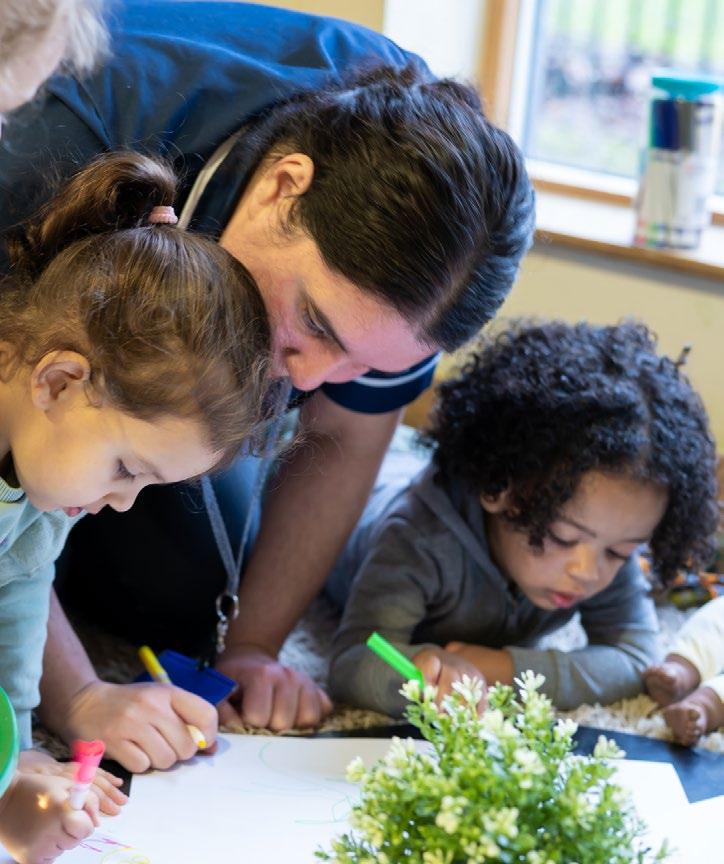












































Happy New Year from all of us here at Families! We wish you the very best for the months ahead.
It’s hard for everyone to keep New Year’s resolutions – especially children. Download our free colour-in Reward Chart which may help to keep your children engaged.
Whilst everyone feels like hibernating in winter, getting outside is good for us so, to motivate you, we’ve got some ideas for seasonal family activities as well as some projects which will help welcome more wildlife to your garden. And, once you’re back indoors? We have some great ideas for making family nights in special.

Finally, in this issue, we have Britannica Magazine subscriptions and other goodies to giveaway! Apply inside the magazine. By doing so, you’ll also ensure you receive our digital magazine with lots more content and goodies on offer.



Congratulations











































With Covid and the move to online platforms, tutoring has become more accessible, with more options and opportunities available. As a result, over fifteen percent of UK children are now receiving private tuition. But how can you get the best results?


 By Dr Jamie Lingwood
By Dr Jamie Lingwood
In May, Year 2 (KS1) and Year 6 (KS2) pupils will take their SATS exams. Yet, from their very first day at school, children are being trained to be able to perform in preparation for these assessments. So what support can you give at home?

Early language development is incredibly important and sitting down to read with your child gives them a big advantage in this area. But what are the best ways of helping your child to enjoy shared reading and why is it so beneficial?
READ MORE


Paying for childcare isn’t always easy, particularly in the current climate. Yet it’s vital that children experience and benefit from the learning and development opportunities available, especially in those all-important early years.
With this in mind, award-winning nursery group Kids Planet is continuing to take steps to help families secure free childcare provision for early years children, across all its 142 UK-wide sites.
Part of a government initiative, the funded offering aims to help make childcare more readily available and accessible to all families, including those in need - something which Kids Planet itself cares deeply about.
The nursery group has multiple 15 and 30-hours funded childcare places for children ages 2 to 4 years, each week during term time.
As standard, all parents of children ages 3 and 4 years are entitled to 15 hours funded childcare per week, which Kids Planet encourages
parents to take advantage of.
Kids Planet also offers 15 hours of funded childcare to some 2-yearolds if parents are eligible. Examples include those receiving certain benefits, if a child has special education needs or is living with a disability, if a child is being looked after by a local authority or if a child has a kinship/guardianship order.
If you are a working parent with a child ages 3 or 4, you may be eligible to get 30 hours funded childcare depending on your work requirements, salary, age of your children and your location*.
*Some funded places are available to eligible families only. Visit Childcare Choices HERE for the criteria.
Visit Kids Planet HERE to find out more.












My child has a set routine, how will this fit into nursery life? When children start at Kids Planet, we follow their routines to ensure there is a smooth transition from home life to nursery. We work with families to ensure there is a continuity of care.

Is the food cooked freshly on the nursery premises on a daily basis? All our nurseries have a Nursery Chef, who prepares all the food on the nursery premises with fresh ingredients, with no added salt or sugar. Our Nursery Chef is qualified in food preparation and food safety. We cater for all dietary needs.
Do you offer funded places for 2, 3 and 4 year olds? Yes, we offer FREE funded places for eligible 2 year olds, and 3-4 year olds are eligible for 15 and 30 hours of free childcare. Visit www.childcarechoices.gov.uk for criteria.


We are in your area!
Plan some great reading for your child with our children’s book suggestions, all just published or due to be published this year.
DJ Baby Funky novelty board book featuring spinning record turntables! Ages 1+.

Ten Little Bugs Part traditional counting rhyme, part fun-filled story - perfect for sharing. Ages 3-5.

Grandad’s Pride
Beautiful follow-up to Grandad’s Camper, filled with heart and purpose. Ages 3-6.


Charming picture book about the unusually literary fish. Ages 4-8.
Weird but true! 2023
National Geographic annual loaded with brain bending facts and photos. Ages 7-10.


Special World Book Day story (£1) in the actionpacked series. Ages 8+.
Special World Book Day story (£1) - a funny, joyful romp. Ages 6+.

Valentine Crow & Mr Death

Distinctive, warm and funny. From highlyacclaimed Jenni Spangler. Ages 9+.
Gilbert the Goblin’s new adventure – finding the legendary yeti. Ages 4-8.

















 By Sarah Ockwell-Smith
By Sarah Ockwell-Smith

The ‘terrible twos’ aren’t called that for nothing! This stage of a child’s life is all about big feelings. Scientifically, it relates to the undeveloped prefrontal brain cortex meaning a child is unable to regulate their own emotions.

What is a tantrum?
Tantrums describe the state of an individual who is out of control, full of big emotions and stress hormones and unable to calm themselves down. Tantrums can happen right into adulthood but adults learn to self-soothe.
Toddlers don’t possess these skills yet. They are not being naughty or manipulative, they are simply being toddlers. Tantrums are a normal and exceedingly common feature of child development. Research has found that nearly nine in ten children between 18 months and 2 years regularly have tantrums, with most having at least one a day, lasting on average between thirty and sixty seconds (although it is not uncommon for them to occur far more frequently and last for much longer).
Contrary to popular belief, ignoring, shaming or punishing tantrums can make a toddler’s behaviour much worse. These approaches ignore a child’s difficult underlying feelings and don’t resolve the cause
or help the toddler regulate their behaviour. Experts have discovered just how much infant brains are affected by the level of parental care they receive. With nurturing attention, the part of their brains responsible for regulating emotion become better connected as they grow. READ MORE




Cooking multiple meals at one time and then storing for later use.
Food is cooked in a ‘batch’, then stored in airtight containers. Meals are stored in portions for ease.
Batch cooking often involves doubling, tripling or quadrupling ingredients.
Big pans - you’re cooking bulk so ensure you have enough big pans to cope.
Large mixing bowls to bring all those ingredients together.
Storage containers and resealable freezer bags. Choose the right size for your family.
Labels. Keep track of what you’ve got and when you cooked it.
Saves money - buying food in bulk is cheaper. Saves time – you don’t need to cook every evening.
You are cooking when you want to and not when you have to.
It’s healthier as you always have a tasty nutritious meal on hand.
Set aside a few hours so you’re not rushed.
Prepare ingredients - weighing, measuring and chopping first will make the job easier.
Clean as you go and, if making several recipes at once, tidy up as you go too.
Cool before you freeze; food will keep better and save fridge energy.
This 2 minute video from The Batch Lady shows exactly what you’ll need to start batch cooking freezer meals.
This short video from The Batch Lady offers a great rundown on how to plan weekly meals for your family.








Here’s







Parents wanting to locate a local children’s physiotherapist can now use an online directory launched by Association of Paediatric Chartered Physiotherapists.

The majority of children’s physiotherapists work in the NHS. Your GP can advise about local services and make a referral, if appropriate. However, some parents choose to seek advice and treatment from an independent or private physiotherapist either instead of, or to supplement, NHS care. Many children need support from a physiotherapist at some time during their childhood. This may be sought for advice and treatment relating to posture and movement or for acute injuries.
Qualified children’s physiotherapists are regulated, have additional expertise in child development and childhood conditions and the right skill base and knowledge to deliver the best care for babies and children. Find out more HERE


Be fully present
Phone alerts and notifications are constantly distracting and family members often have to compete. Being fully present with the activity or conversation we’re having with our children - without distraction - demonstrates that we value ‘real’ time together and are fully available.
Research shows that too much screen time can lead to mental health issues in children, whilst lost time interacting with family/ peers can impact their social development. Monitor screen time, ensure content is ageappropriate, communicate about inappropriate images and model healthy device habits.

Children absorb emotions like sponges and overhearing the news or emotionally-charged adult conversation can fuel their anxiety. If your child is worrying about the future, use mindfulness to bring them back to the present moment—’right here, right now, with you, all is well.’ Tell them that you love them no matter what.


Nature-deficit disorder (NDD) can contribute to higher rates of physical and emotional illnesses. But the good news is, it can easily be reversed. Spending time in nature is easier than we think: village greens, parks, commons and nature reserves abound in the UK and they provide the perfect setting for free family activities.



Claire at Bridgemaker Mindfulness shares her top tips.

Reading is relaxing, distracting and a good alternative to screen time. A 2009 University of Sussex study found that reading can reduce stress by up to sixty eight percent. Just six minutes of relaxing into a good book can lower blood pressure and muscle tension.
Children are more likely to express their feelings when they sense we are fully available. Sitting somewhere that they have to pass by when they return from being elsewhere and gently inviting them to join us can be a good start. Listen intently without moving into ‘fix-it mode.’

Creating a comforting, wind down routine can help (reading a book together, listening to soothing music). Try placing hands on the belly, breathing easily and focusing on the breath, following the gentle movement of the belly that rises and falls. For the busy mind, try counting the breath to ten (in – 1, out – 2 etc) over and over.
Mindfulness apps/recorded meditations can help adults and children to relax and unwind but nothing compares with attending a course with a qualified mindfulness teacher which teaches key mindfulness skills. However, if, despite your best intentions and care, your child’s behaviour or anxiety level becomes worrying, do seek medical advice from a GP.


















Let them experience ‘age-appropriate risk’ under adult supervision AT ALL TIMES. Research shows that it’s essential for a balanced childhood.

The use of a power tool is an important life skill that is good to learn early.

Challenge your child to live blindfolded – it’s fun and builds empathy.


It’s best children learn about fire safely with you.
Children can’t resist throwing - and it can be managed safely.


A life skill that develops with experience, whittling is a fun introduction.

Another irresistible urge for children - fun and beneficial when done safely.

A classic science experiment which is spectacular - but messy!
This ancient British game can be safely played if done correctly.
Use a bow and arrow
Though potentially hazardous, it’s great for developing situational awareness.


















